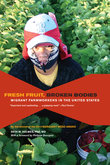by Seth Holmes
This guest post is part of a series published in conjunction with the meeting of the American Anthropological Association in Washington DC. UC Press authors share insight into their research and stories that reflect this year’s conference theme “Producing Anthropology.” We hope these personal glimpses into their scholarship will inspire a broad community of readers. Come back for new posts every day between now and December 5th.
Recent debates over immigration reform have been abstract, and often fail to consider the real life experiences of individual immigrants themselves. Over the last decade, I spent time conducting fieldwork in a vertical slice of transnational agriculture with indigenous Mexican migrant farm workers, border patrol agents, health professionals, and farm owners.
During this field research, my migrant companions and I lived in labor camps and picked berries in Washington State, stayed in a slum apartment and pruned vineyards in California, and harvested and planted corn while living in a village in southern Mexico. We also crossed the border from Mexico into Arizona together, and spent time in a border patrol jail before my companions were deported and I was released with a fine. In Washington State, the farm workers toiled every day, rain or shine, from before dawn until that day’s field was harvested. They worked seven days a week, bent over, picking berries and pruning grape vines.
Many politicians and media outlets depict migrants as “criminals” or “illegal aliens,” who are “draining our economy” and therefore do not deserve benefits afforded American citizens, including health care. This exclusion from health care coverage continues for many categories of immigrants, both undocumented and documented, even under the Affordable Care Act. Quite the contrary of the common political and media representations, I found my undocumented Mexican immigrant companions to be law-abiding, hardworking people who are anything but burdens on the American economy. In fact, many farm workers work so hard to provide healthy, fresh food that their own bodies become sick or injured.
Farm work carries a physical toll. Even though I worked in the fields only one or two days a week, I experienced stress as well as back, hip, and knee pain for days after. I watched my farmworker companions suffer these pains, as well as give premature birth, develop knee and back injuries, suffer extreme stress, and experience pesticide poisoning. I watched these same farm workers avoid medical care whenever possible, continuing to work long days in order to care for their families and harvest fruit for American consumers. Conducting fieldwork in this vertical slice of U.S. agriculture deepened my theoretical understanding of the ways in which social hierarchies and health inequalities come to be perceived as normal and natural in society and in health care, such that farm workers and others are often understood to deserve their social positions and health problems.
The United States reaps enormous benefits from the work of immigrant farm workers. They labor under difficult and dangerous circumstances, often harming their own bodies in order to provide American consumers with fresh food. It is time to move past political posturing to do what is right for the people who work hard to feed us. These people deserve truly comprehensive immigration reform and they deserve health care.
Seth M. Holmes is Martin Sisters Assistant Professor of Public Health and Medical Anthropology at UC Berkeley. He is the author of Fresh Fruit, Broken Bodies: Migrant Farmworkers in the United States (2013), winner of the Society for the Anthropology of Work Book Award and the New Millennium Book Award from the Society for Medical Anthropology.
Please use hashtag #AAA2014 when sharing on Twitter or Facebook.


